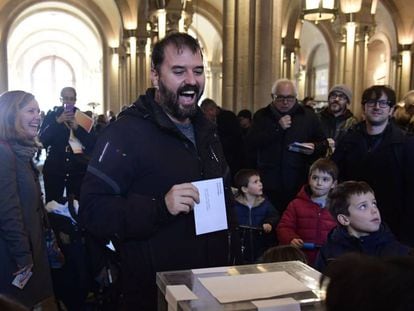Carles Puigdemont: “The Catalan republic has won the elections”
Arrest warrant still pending for ousted premier which could complicate pro-independence government


Junts per Catalunya (JunstxCat), the party of ousted Catalan premier Carles Puigdemont, won the largest number of seats (34) of the three pro-independence parties in the Catalan regional election on Thursday.
Supporters of Junts per Catalunya described the result as “heroic”
While Puigdemont’s party won less votes and seats than the constitutionalist party Ciudadanos (37), it hopes to govern with the support of the Catalan Republican Left (ERC) and the anti-austerity party CUP, which won 32 and four seats respectively.
The ousted premier, who fled to Belgium after the unilateral declaration of independence in the Catalan parliament on October 27 and who faces possible charges of sedition and rebellion, had said during the campaign he would return to Spain if the pro-independence parties won the Catalan regional election. But there is still an arrest warrant out against him, as well as for the four ministers of his sacked government who fled to Belgium. This makes their return to Spain difficult.
A senior representative of Junts per Catalunya, Eduardo Pujol, said on Thursday, “Rajoy has lost. Now is the time to rectify, repair and restore a legitimate government.”
Junts per Catalunya was buoyed by results in the countryside but did far less well in Barcelona
Upon hearing the results yesterday, Puigdemont announced: “The Catalan republic has won against the monarchy of 155,” making reference to article 155 of the Spanish constitution which was activated by Spanish Prime Minister Mariano Rajoy in response to the passing of a unilateral declaration of independence and which stripped Catalonia of its autonomous powers.
The party must also consider what to do with members who have been elected to the Catalan parliament but are either in Brussels or in pre-trial detention. If they are not able to attend sessions in the Catalan parliament, the pro-independence groups may lose their majority.
There is also uncertainty about how the separatists will continue their push for independence. While Junts per Catalunya has not mentioned a unilateral path to independence, the CUP whose support they must secure if they are to form a majority government, has campaigned unwaveringly for this option.
If deputies in pre-trial detention or in Belgium are not able to attend sessions in the Catalan parliament, the pro-independence bloc may lose its majority
Puigdemont’s party, which was not predicted to perform as well as it did in the elections, was buoyed by the vote in inland Catalonia while results in Barcelona were a lot less pleasing. With 98.5% of the vote counted, Junts per Catalunya came in second place – 156,808 votes behind Ciudadanos. The ERC, which split the pro-independence vote, won more support in urban areas. Puigdemont’s campaign focused almost exclusively on the ousted premier and the argument that the elections should be used to “restore” him to power.
Supporters of Junts per Calalunya have described the results as "heroic." From the campaign headquarters, campaign manager Elsa Artadi said "today is a great victory for the independence movement."
English version by Melissa Kitson.












































